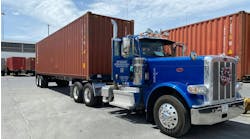FBI reinforces Orange terrorism warning The National Infrastructure Protection Center (NIPC) of the FBI has issued a bulletin reinforcing the current Orange level of the Homeland Security Advisory System.
Al-Qaeda is reported to be actively seeking opportunities to launch attacks using both traditional (explosives) and non-traditional (chemical, biological, radiological and nuclear) CBRN weapons.
The American Trucking Assns. (ATA) has advised trucking operations to consider the following actions:
- Terrorist planning may begin months or years before an actual terrorist attack. Consider previous unusual incidents, such as possible surveillance, when evaluating yourself or your customers as to whether you are a potential target.
- Consult information that is readily available regarding your operations and facilities that may be a potential target, particularly on the Internet, and consider how that information might assist terrorists interested in planning an attack. Terrorists will likely research potential targets extensively prior to an attack. Consider revising or removing such information from public access.
- Vary your security routines and recommend customer's facilities take similar steps. Terrorists, like criminals, look for routines they can identify and exploit.
- Consider the potential for threats from "insider" personnel employed at target facilities, as terrorist groups may attempt to infiltrate a facility or potential target.
Most CBRN threats represent an inhalation or contact hazard. To minimize further contamination, individuals who come in contact with an unusual substance should cover their mouths with a cloth while leaving the area, avoid touching surfaces, and wash their hands thoroughly, NIPC said.


